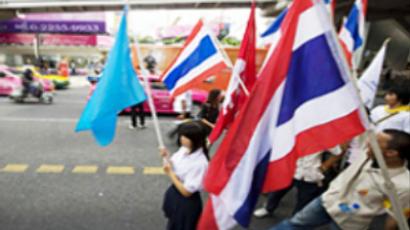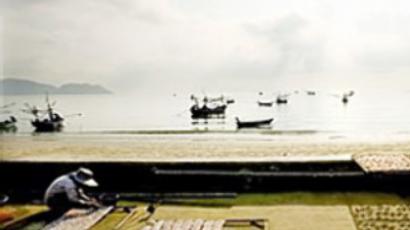Thailand's political crisis: a duel of statesmen
Thai politics have acquired the pace of a Hollywood action movie. The current crisis has other features of a silver screen adventure as well, among them – violence, growing by the day, and the lack of consideration for any consequences shown by
Prime minister Somchai Wongsawat touched down at the Don Muang Air Force base on the way from the APEC summit in Lima, picked up several cabinet ministers from the makeshift government house there, and immediately left for Chiang Mai, the home town and political stronghold of his brother-in-law, police Colonel Doctor Thaksin Chinnovat. On the ground in Bangkok crowds of protesters calling for his resignation were wreaking havoc at Don Muang and Suvannaphumi international airports, trying to prevent his return to the country and to Government House – in their hands since September.
The crowds were led by the People’s Alliance for Democracy (PAD), a loose political movement harassing their second government in the past six months and united by one and only common goal: to destroy former Prime minister Thaksin Chinnovat. They called the previous and the current prime ministers his puppets.
Thaksin Chinnovat, a self-made media and communications billionaire started his political career as a Deputy Prime Minister in the 1990s, with a special responsibility for tackling the Bangkok traffic problem. He could be seen every day flying over the congested roads of the Thai capital in a police helicopter, checking how his plan worked.
It didn’t, in spite of weekly bonuses to the best traffic police unit paid out of Thaksin’s own pocket. Even sophisticated electronic devises introduced by Thaksin, together with the well-facilitated efforts by the traffic policemen, could not beat one factor: there were simply too many cars in the city of Bangkok. But the effort was well appreciated by the people of Bangkok and any meager improvement was attributed to him.
The traffic problem was solved by the 1997 financial crisis. By then Thaksin Chinnovat was still at the helm of one of the big political parties, The Power of Dharma. He was a chosen successor of the party’s founder General Chamlong Srimuang, a one-time very popular Mayor of Bangkok and leader of a mass protest which caused major bloodshed in May 1992.
The financial crisis badly damaged the image of the Democrat party, the oldest in Thailand, because during the crisis it busied itself with macroeconomic problems at the expense of social security and invited in the IMF, which demanded adoption of a package of laws that opened the Thai market to foreign operators as never before.
Nationalism was the response of the majority of the population, ‘city folks and country cousins’ alike. At that moment Thaksin dissolved the old party and formed a new one – Thai Rak Thai (Thais love Thai). With that and a series of nationalist slogans, he won a landslide victory in the 2001 election: for the first time in the 50-year-long history of Thai democracy, one party had not just a constitutional but an arithmetic majority in parliament.
Six years of Thaksin’s rule (2001 – 2006), two clearly won four-year terms, cut short by a military coup (it prevented bloodshed that peaceful PAD was about to cause), are remembered differently by different social groups in Thailand. The poor of the city and most of the rural people are ready to fight for Thaksin and some – to die for him, for his social security programmes, his ‘village funds’, his cheap medical insurance, his programme that turned local handicrafts and unique health food products into export goods. Post-Thaksin elections, held a year after the coup, have shown clearly that Thaksin’s supporters – those who chose the ‘proxy’ of the dissolved Thai Rak Thai, the People’s Power party, still constitute a vast majority of voters.
The city-dwelling middle class became divided: there are still some Thaksin supporters in that social sector but the majority, especially in Bangkok, turned against him. Thaksin was accused of corruption, tried and sentenced to a prison term of two years, the verdict confirmed by the Supreme Court – all in absentia. But the most damaging accusations he faces are those of causing damage to the Institution of Monarchy. Not proven by any court so far, these accusations are repeated daily from the TV screen by the main PAD leaders: TV host and media tycoon Sondhi Limthongkul and – surprise – General Chamlong Srimuang, Thaksin’s mentor in politics who spent a decade of semi-monastic life of virtue and charitable deeds to return to politics recently, now as Thaksin’s arch-enemy. Many in Bangkok believe now that Thaksin has indeed intentionally caused damage to the Monarchy, and want his blood for it.
Thaksin’s supporters also sometimes form crowds in red t-shirts and hit the streets, but their leaders mostly try to avoid confrontations with the PAD’s yellow t-shirts. Firstly, because yellow is the colour of the King, and anti-PAD protesters are as much Royalist as their adversaries. Secondly, because the armed forces stand by to take power in case massive bloodshed starts, and that would mean another one-year cycle (at least) before democratic procedures can be restored.
In recent months the stand-off between the two successive ‘pro-Thaksin’ governments and the PAD has been slowly turning into a violent fight, with the Army standing aside, arms folded, waiting for a moment when its interference would become inevitable. The Army doesn’t want to govern, that’s what the Generals keep saying, and I believe them completely. After the coup they would have to hand power to an appointed civilian government for a year, and then there would be another general election which, most probably, would again bring Thaksin’s supporters to power. Round Two, all the way. No one needs that to happen. The only option left is to dissolve the parliament, which would effectively end the Cabinet’s term as well, and organize a new election. The result would probably be the same: Thaksin’s supporters coming back to power. Round Two, a shortened version.
There is another option: to amend the constitution or, rather, cancel the amendments made during the term of the military-installed civilian government in 2007. But that is something the PAD would never go for: the whole point of changing the constitution to the present version was to ensure that Thaksin Chinnovat cannot return to power. The nation’s main general law was amended to prevent one man from getting elected again!
Constitutions are not written for one single person or against one single person. If they are amended to that effect, they get even with those who abused them. The members of the appointed parliament, when they adopted the amendments, were thinking of preventing a civil war which had nearly started before the military coup. But the way they have chosen turned out to be just another path to the same edge of the same abyss.
In fact, the fight between the pro-Thaksin and anti-Thaksin forces has long since become a duel between Thaksin and the leadership of the PAD, fought with people’s emotions, strength and lives as weapons. Neither side is ready to yield. Thaksin, in exile, forced to leave London after his British visa was revoked, announced from an undisclosed location that some day soon he will return to Thailand as prime minister. The PAD, for which it is harder and harder to gather huge crowds apart from ready bunches of its core members, decided on a violent attack on the airports, disrupting air traffic for days and causing trouble and sorrow to ordinary people.
When the airport siege began, a columnist of The Nation, one of the two English-language newspapers in Bangkok, wrote: ‘what we saw at the airport was like Luc Skywalker turning into Darth Vader before our eyes.’
Indeed, after the airport attack the PAD is definitely going to lose a lot of its popular support. On the other hand the government is cornered and may yield to the Army’s urge to dissolve the parliament and start a new electoral cycle.
The end of this round is near. But that will not be the end of the game, so God bless those Thai leaders who still manage somehow to play out this dangerous duel without – so far – regular loss of life.
Evgeny Belenkiy, RT.














